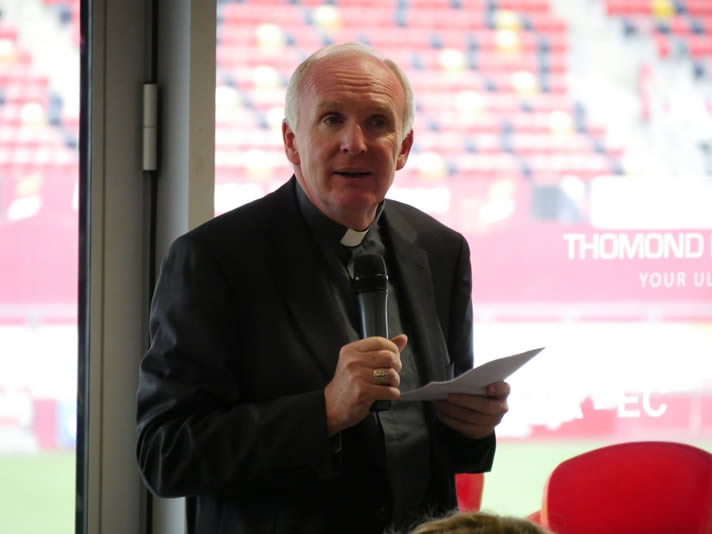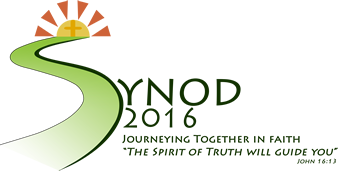Speaking Notes of Bishop Brendan Leahy
Synod – Delegates Meeting, Thomand Park, June 25, 2015

Download this text as a PDF file here
There are three points I’d like to make this morning as we gather here in this wonderful setting of Thomand Park.
The first point is that I am reminded of a few scenes from the Bible that we are re-living in our own way.
In the Book of Numbers 13, for instance, we read of the meeting that was held when those sent out to do a reconnaissance trip of Canaan returned to Moses. They told the gathering of the wonderful land of milk and honey they had discovered and they even showed them some of the lovely fruit they had cut down and brought back as an example (a cluste of grapes). But they also reported the difficulties – the people they had met in Canaan were very tall people and, they said, “we felt like grasshoppers beside them”! I’m sure for us too, we have lived months when we have seen fruits of our labours but also noted some fears. Fruits and fears go together in a Synod process.
Another scene comes from Jesus’ own ministry. At a certain point he sent out his disciples around the villages to proclaim the Kingdom of God. We are told that when they came back, “the apostles gathered around Jesus, and told him all that they had done and taught. He said to them, ‘Come away to a deserted place all by yourselves and rest a while.” (Mk 6:30). It’s important to go about, be busy, consult a lot of people but it is also important to take time out to reflect, discern and rest. Rest, at least “for a while”, with all that goes into that in terms of prayer, reflection, disernment is important in a Synod process.
The third scene comes from the Acts of the Apostles that tells us of the early Church. Several times we are told that the First Christians had the practice of coming together and telling what God had done. For instance, in Acts 14:27, we read about when Paul and Barnabas arrived to Antioch, “they called the church together and related all that God had done with them”. Telling our story is important. It is good to share and be mutually encouraging. Recognition that God has been at work in our lives is part of a Synod process. Encouraging and supporting one another is an essential element of the journey.
So here this morning, let’s renew our commitment to have the Risen Jesus among us – the One who gives us courage and rest, and offers us an experience of God. The Risen Jesus is among us in our love for one another. It is He who makes our work fruitful, and helps us overcome fears and provides the setting for our sharing with one another.
*****************************************
The second point I want to mention is that, together with over 500 pilgrims from the Diocese, I was in Lourdes this week. It does you good to go to Lourdes because, for a Church that is often criticised for all kinds of things, at Lourdes we see a true image of the Church. We see a living Church made up of people, young and old, who try to love one another, help one another, nourished by the Eucharist at mass, strengthened by the community spirit, guided by the Gospel, inspired and sustained by the invalids who offer their sufferings. And young people are so very much at the heart of this incredible and enriching experience. It is wonderful to see.
But beneath all of that is a fundamental point that Lourdes reminds me of. It is one that I want to highlight again at this point of our Synod journey: Mary is at the heart of the Church. It’s so easy to think the Church is just the Pope, Bishops, priests, sacraments. Of course, they are all essential elements of the Church and in a way we could say that all that side of the Church is linked to Peter the Apostle. But the Church is much more. Mary was before the apostles. Mary brought Jesus into the world. Mary was alongside Jesus as he was dying. Mary was in the Upper Room as the Church came to life at Pentecost.
There is a Marian aspect of the Church that we sometimes forget. It is fundamental. When I say the Marian profile of the Church is fundamental I am not thinking so much about devotions and special prayers to Mary, important as they are. Rather to talk about the Marian dimension of the Church is to remember that the Church, in imitation of Mary and, indeed, in continuing Mary’s role, is fundamentally about bringing Jesus to life out in the world, in our relationships, in society, in the bits and pieces of everyday” as Patrick Kavanagh put it.
Pope Francis has often said this is the side of the Church that must emerge much more. So often, our analysis of church issues can get stuck in the means that build up the Church but we forget the goal, the purpose of mission, the reason we exist – service of God and missionary outreach to others. And in that sense I would like to recall Fr. Paul Phibilert’s comments to us at the very first gathering – that the big challenge in our Church renewal today is that we need to help each other move from being clients of an ecclesiastical franchise living members of a vibrant community radiating Christ in our world. This is important as we move into discerning the data we have received from our consultation.
The theologian von Balthasar has written that “perhaps it is particularly necessary for our times to look at Mary…She really shows herself and defines herself as the model Church, upon whose form we should form ourselves. We: that means every single Christian, and it means, perhaps even more, our image of what the Church is. We are for ever concerned with reshaping and improving the Church in accordance with the demands of the time, following the criticisms of opponents and our own models. But do we not thereby lose sight of the one fulfilled standard, indeed the Model? Should we not constantly keep our eyes fixed on Mary in our reforms, not in any way to multiply the Marian feastdays, devotions…but rather simply to know what Church, what ecclesial Spirit, and what ecclesial behaviour is?”
*****************************************
The third point I’d like to make today is a word about your role of delegates. On the one hand, you are delegates for your parish or group. But you are also much more. As we hear today of the experiences of others, I invite you to recognise the successes and setbacks of others as your own.
Perhaps you’ll hear that in such and such a place there was a wonderful response. You might begin to feel a little envious. You might feel you tried hard but the response wasn’t as great as you might have hoped. But I want to suggest to you that we need now to put aside our own personal or parish or group successes or limits. We are in this together. We are involved in a “Diocesan” Synod. We are bound to one another. It is a collective process that expands us. All of our individual efforts are now coming together into a much bigger picture.
The successes or setbacks belong to all of us. We remember Aristotle’s phrase: “The whole is greater than the sum of the parts”. There’s a synergy at work that is greater than any of us because a Synod has a grace of the Holy Spirit attached. The Spirit knows how to take all of our individual contributions and then, not unlike what happens at Mass, the Spirit transforms those elements into something new as he speaks to the Church in the Diocese of Limerick. Remember too that Jesus only had two fish and five loaves of bread but managed to perform a miracle that fed thousands. I remember a comment by the late Cardinal Van Thuan who said God mustn’t have been good at maths or, rather, that his maths is very different to ours. He can make big what we might see as limited.
Take the example of the mosaic. There are many tiles in a mosaic. Each is important but it is the overall image of the mosaic that you enjoy. So be thankful. Each one of us has contributed and is contributing to the Diocesan Synodal process. You have done your part and for that I thank you. Go méadaí Dia bhur stór.
